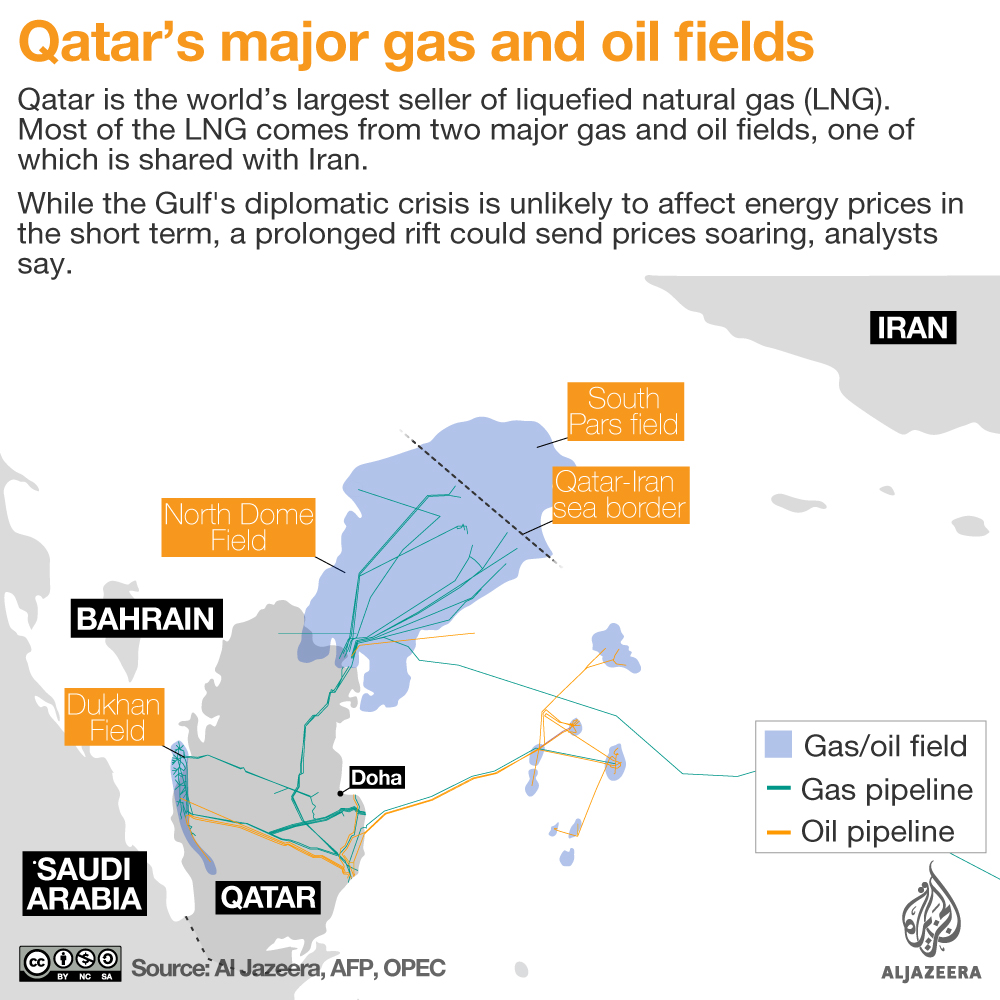Qatar to increase gas production by 30 percent
Qatar Petroleum chief also says company will not shut the pipeline that delivers gas to the UAE.

State-run Qatar Petroleum has said it plans to increase natural gas production by 30 percent over the next several years.
Saad Sherida al-Kaabi, the company’s CEO, told reporters on Tuesday that Qatar Petroleum intends to raise production from 77 million tonnes of natural gas to 100 million tonnes a year by 2024.
Keep reading
list of 4 itemsQatar emir condemns ‘genocide’ in Gaza, urges ceasefire at GCC summit
‘Enduring commitment’: Key takeaways from US-GCC joint statement
Analysis: Efforts to end Assad isolation gather speed after quake
The announcement comes after the company said in April it was boosting output of its North Field, which it shares with Iran off the Gulf state’s northern coast.
“The new additional volumes will be secured by doubling the size of the new gas project in the southern sector of the North Field, which Qatar Petroleum had announced last April,” a statement by the company said.
The April announcement meant an end to the self-imposed ban on development of the field that it declared in 2005 to give Doha time to study the effect on the reservoir from a rapid rise in output.
READ MORE: Qatar-Iran ties – Sharing the world’s largest gas field
Qatar is already the world’s largest exporter of liquefied natural gas (LNG). It has several fields within its territorial waters.
The LNG market is undergoing huge changes, however, as the biggest ever flood of new supply hits the market, with volumes coming mainly from the US and Australia.
Gas has helped transform Qatar into one of the richest countries in the world, propelling its rise into a major regional player and helping fund huge infrastructure projects such as the 2022 football World Cup, which will be hosted by Qatar.

‘Not affected’ by GCC crisis
Amid the ongoing crisis between Qatar and several of its neighbours, Qatar Petroleum has continually reassured its customers that the company has not been affected.
On Tuesday, Kaabi reiterated that the company does not plan to cut the pipeline that delivers gas to the UAE despite the crisis.
“Qatar Petroleum will not be affected by the siege,” he told reporters in Doha.
In June, the company said it was “business as usual” after Saudi Arabia, Bahrain, Egypt and the UAE severed diplomatic ties with Qatar, accusing it of supporting “terrorism”. The allegation has been rejected by Doha as “baseless”.
Qatar Petroleum has also said it “mobilised all available resources” to mitigate any actions that could disrupt supplies.
READ MORE: All the latest updates on the Qatar-Gulf crisis
Also in June, Kaabi told Al Jazeera Arabic’s Liqa al-Yaum (Today’s Meeting show) that although there was a “force majeure” clause in the Dolphin gas pipeline agreement – which pumps around two billion cubic feet of gas per day to the UAE – Qatar would not stop supplies to its “brothers”.
“The siege we have today is a force majeure and we could close the gas pipeline to the UAE,” he said.
“But if we cut the gas, it does great harm to the UAE and the people of the UAE, who are considered like brothers … we decided not to cut the gas now.”
The air, sea and land restrictions imposed by its three Gulf neighbours have not so far affected maritime routes for Qatari LNG vessels, which can pass through the Strait of Hormuz.
Most of Qatar’s almost 80 million tonnes of annual LNG supplies are shipped in tankers, mainly to Japan, South Korea and India, as well as to several European countries.
Any disruption to Qatar’s LNG exports could anger the European Union as the UK, Spain and Poland rely on Qatari LNG.